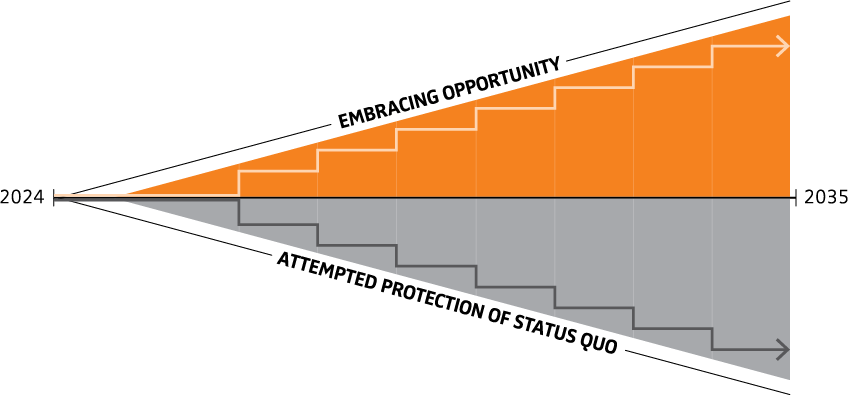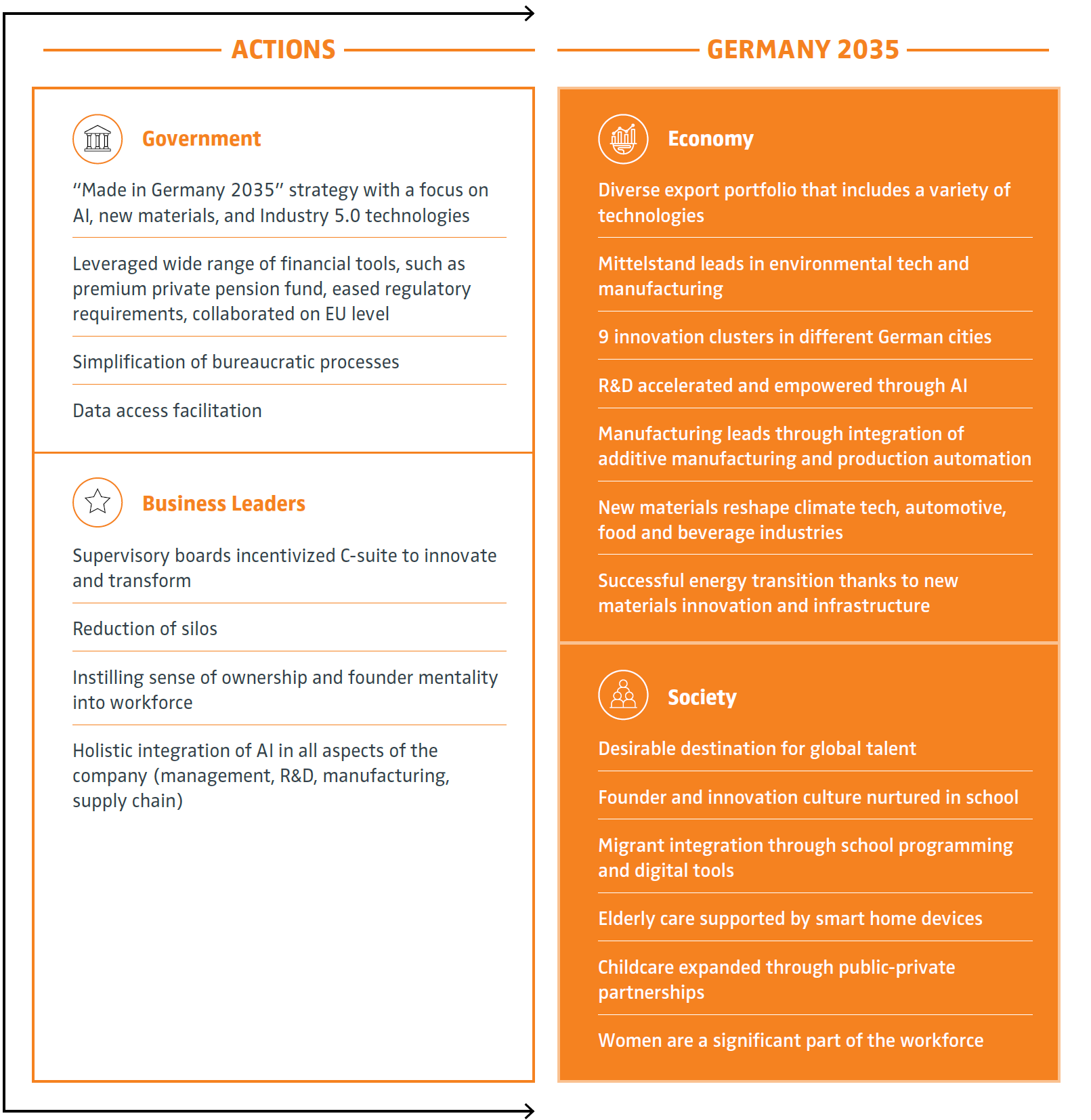A new vision for German business in 2035 … from industrial precision to punk entrepreneurship, inspired by innovators like Biontech and Lilium … is Germany ready to change its game?
December 17, 2023

“Germany” used to mean industrial excellence, technology, reliability and quality of life.
Whilst German industry is still packed full of industrial giants – BASF to Bayer, BMW to Bosch – Germany is now also becoming a nation of entrepreneurs, harnessing the academic excellence and commercial infrastructures to create a new generation of business.
However the bigger, legacy companies, who used to be admired around the world, are struggling to embrace the new zeitgeist.
The problem with success.
Germany has been so successful in industrial engineering and production, that is has perversely been slow to look beyond product and process for new types of innovation. The academic discipline and rigorous application of proven methodologies has created a stubbornness, and stifled the free-thinking (more imaginative, more intuitive, more irreverent thinking) that is so common to many of the world’s innovation hotspots.
Having lived for a short time in southern Germany (I studied high temperature superconductivity physics at the Albert Ludwig Universitat in Freiburg im Breisgau), I became acutely aware of this “engineer” mindset. Whilst I hate stereotypes, there is something in the German psyche, that seeks logic and precision, detail and structure. It doesn’t like ambiguity, or too much change.
Having spent the last 30 years working across the world with many different companies, including German brands (such as Adidas and Allianz, Bayer and Bosch, Henkel and Lufthansa, T-Mobile and Volkswagen), I notice a difference to other countries in both West and East. Most German business people seek academic doctorates for example, becoming technical experts rather than evolving as business leaders, and continuous professional development is rare. Most German businesses are family owned, with strong influence from owners and also from unions. Most businesses are incredibly product-centric, with a services and service culture slow to take hold.
Of course German businesses have been incredibly successful – they have been the engine of European growth for the last 50 years. But their innovation has largely been incremental – making existing business, products and processes, better.
Prof Khairy Tourk, of the Stuart School of Business in Chicago, says that Germany’s strong position in fields such as automotive engineering, chemicals and factory machines has given the country a “resilience” in the face of economic adversity that made it stand out compared with other countries such as the USA and United Kingdom.
“Germany has performed brilliantly when it comes to adding new ideas to products and processes in the kinds of sectors in which it has traditionally excelled,” says Marco Annuziata, GE’s chief economist. “If you look at a BMW car you will find it packed full of the kind of incremental innovation that the Germans are good at and which gives the country a reasonable amount of self-confidence for the future” adds Tourk.
Therefore this is certainly not a criticism. But it does provoke a question, about how this approach to innovation will be sufficient in a world of more dramatic changes.
Like any successful business, it is hard to let go of the model that made you successful, and tempting to keep squeezing more out of what has worked before. However the success models of the past are unlikely to create future success.
What’s the challenge for German business?
Do German businesses have the imagination to adapt to a changing world?
Where factories are displaced by 3D printers, where robots and AI can replicate the know-how of a highly skilled worker, and where emerging markets can replicate the quality of production at much lower costs … can German leaders develop new ideas, alternative strategies and business models, innovative products and services, to compete in this new world?
The answer has to be yes … And the more enlightened German business leaders are waking up to the new challenges, and to the new challengers.
In fact, walk around the streets of Berlin, for example, and you will see a start-up culture every bit as vibrant as Silicon Valley, Stockholm or Shanghai. The youth culture, the irreverence and collaboration, of “hippy” Berlin is actually driving a new mindset in business. Gone are the suits who only see process diagrams and quality assurance, in come the punks (ok, millennials, hipsters, creatives) who have passion and vision to disrupt the status quo.
Large organisations are desperate to innovate differently too. A few companies like Siemens have truly seized the innovation challenge, but still have to work against an engrained culture of inertness. Smaller companies like Biontech who championed the mRNA vaccine development during the pandemic are a new generation, as are startups like Lilium, the flying taxi business.
Whilst some business leaders struggle to grasp the new world, others are embracing it rapidly. Design thinking, for example has become one of the most sought-after business disciplines, because its more intuitive approach is so needed. Similarly Business Model Innovation, has given the technocrats a new context for their structural thinking.
Germany’s future business vision
A new report by FTI with Handelsblatt and Pulse says “Today, Germany stands at a crossroads: it can either maintain its current course, and risk a gradual economic and societal decline, or it can choose to reinvigorate its legacy of innovation by investing in digitalization, modernization, education, and new technologies. The path of innovation is not merely a choice; Germany must assert its leadership in the 21st century. The world is being reordered, and as geopolitical tensions rise and new alliances form, a stable public and private sector leader is needed.”
And offers hope, with “The Mittelstand—the core of Germany’s economy —will play a vital role in this transformation. Together with universities, innovation hubs, government agencies, and Germany’s largest companies, the more than 1,300 “hidden champions” are poised to become global leaders in a wide range of fields. Our analysis reveals that Germany’s opportunity to lead once again is not just possible but necessary for the future prosperity of Europe and the global economy. This leadership will require a significant shift in mindset and strategy, moving away from traditional comforts towards a future-oriented, risk-embracing approach.”
In simple terms there are too scenarios for Germany over the next 10 years – somewhat akin to the fixed or growth mindset – to embrace the opportunities of a changing world, or to stagnate and decline as it seeks to retain the status quo:

A new vision for German business in 2035 emerges … “if leaders take focused, decisive action today to embrace opportunities and fully leverage the country’s strengths, Germany will continue to be a global leader in innovation” … and is built on five pillars:
- Germany as a dynamic economy fuelled by technological innovation and sectoral diversity … The strategic application of AI across sectors streamlines operations and dramatically speeds up research and development, futureproofing Germany’s economic leadership and diversity.
- Germany as the architect of advanced manufacturing … Germany’s manufacturing landscape is powered by the strategic implementation of automation. The nation excels in designing new materials at scale by leveraging synthetic biology, and additive manufacturing enables rapid, cost-effective production, minimizing reliance on imports and maximizing manufacturing flexibility.
- Germany as leader in ecological integrity and renewable innovations … Germany is on the forefront of climate innovation. Investments in renewable energy research, collaboration with leading scientific institutions, and supportive policies encourage the adoption of ecofriendly practices across all sectors. This holistic approach enables Germany to drive international standards in sustainability and climate resilience.
- Germany as global epicenter of innovation … Corporate governance incentivizes performance, risk-taking, and trial-and-error processes, fostering a culture of continuous improvement. Collaboration happens within companies, across departments, and externally with other private, public, and academic stakeholders in the numerous innovation clusters. The elaborate startup ecosystem makes Germany a desirable hub for global talent.
- Germany as an inclusive and unified society … Germany’s strategic focus on education and health care has fostered an inclusive society. AI-enhanced learning supports a diverse student population, and educational reforms promote social cohesion. The integration of migrants and the provision of new technologies reflect a commitment to building a unified society that values diversity, inclusion, and the well-being of all its members.
However this demands significant change, in mindsets and practical action:

Inspired by German innovators
As inspiration to think positive, explore how Germany can leverage its uncompromising engineering mindset, for a rapidly evolving digital world, here are some of Germany’s most disruptive innovators.What can you learn from these companies, which you could apply your own business?
Biontech … mRNA vaccines from covid to cancer
As Covid-19 raged across the world, Turkish-born Uğur Şahin and his wife Özlem Türeci, transitioned their development of mRNA-based cancer therapies to create an innovative vaccine. Building an ecosystem of experts and partners around their Mainz lab, they were able to achieve in 9 months what had previously take decades. They now believe their approach could transform the future of medicine.
Blinkist … information in a blink
Sebastian Klein and his friends found it hard to continue learning after leaving university. In 2012, they launched Blinkist, an app that summarises non-fiction books in 15 minute “blinks” that can be consumed in audio or video formats. More than 1,500 books in 16 categories are available for the platform’s one million users, from corporate culture to parenting.
Delivery Hero … from restaurant to home
Delivery Hero seeks to be the world’s leading online food ordering platform. Niclas Östberg and colleagues started the business in Berlin in 2011, and the company operates in 53 countries internationally in Europe, Asia, Latin America and the Middle East and partners with 300,000 restaurants. Users can find local restaurants, filter by cuisine, browse menus, read reviews and other information like the restaurant operating times and order takeaway food online. In the UK it uses the brand name Hungry House.
ElektroCouture … the next thing in smart fashion
Lisa Lang, a former engineer, couldn’t find clothes to “express her nerdiness”, she says. In 2014, she founded and fully financed her own fashion technology house, focusing on light wearables. ElektroCouture sells LED jewellery and clothes that glow in the dark – including a jacket that changes colour based on texts it receives. Lang has produced clothing for Lufthansa, IBM and Intel and sells her collection on ASOS and Amazon.
Hello Fresh … great recipes, great cooking, great food
HelloFresh offers meal-kits including ingredients sourced from local suppliers and step-by-step recipes created on a weekly basis by their in-house culinary teams. The company delivers over 7.4 million meals a month to over 800,000 regular subscribers across the world. All countries offer omnivore (Classic Box) and vegetarian (Veggie Box) box options. Celebrity chef Jamie Oliver creates recipes for HelloFresh, whilst a partnership with Vorwerk and their multi-function kitchen appliance Thermomix was launched in Germany and Austria. HelloFresh delivers custom recipes made for cooking with a Thermomix machine.
Lilium … flying taxis from Munich
Lilium is a disruptive aviation start-up based in Munich, founded in 2015. It is currently delivering on its vision of a completely new type of individual transportation and is dedicated to develop and build the world’s first fully electric vertical take-off and landing (VTOL) jet. An estimated range of up to 300 km and a top speed of 300 km/h, along with zero emissions make it the most efficient and eco-friendly individual means of transportation of our time.
N26 … the bank that wants to be different
Berlin-based startup Number26 (or now simply, N26) is trying to reinvent the bank. This might sound crazy, and that’s why the startup has processed step by step. After partnering with Wirecard for the banking back end, attracting 200,000 users the company now has a full license to operate in Europe. “At N26, we obsess every day about great product design and blazing-fast technology. Our goal is always to make banking easy, intuitive, fast, and maybe even a little fun for you along the way.”
Siemens … the exploit and explore mindset
Siemens, the German technology business, seeks to combine the real and the digital worlds to meet the great challenges of our time. It’s diverse portfolio of industrial businesses enjoy the entrepreneurial freedom to serve their customers and markets in the best way possible, the structure is geared toward creating value for customers, creating technology with purpose and thus changing the lives for better.
Zalando … bringing happiness to Europe
Zalando is a European online retailer based in Berlin. The company’s cross-platform online store that sells shoes, clothing and other fashion items. The company was founded in Germany in 2008, and since has begun operating in fourteen European countries and worldwide with spin-offs and subsidiary companies. Zalando was created in 2008 by Rocket Internet (the start-up incubator behind many of Germany’s entrepreneurial brands), Robert Gentz and David Schneider, initially under the name Ifansho. Inspired by US online retailer Zappos, Zalando initially specialised in the sale of footwear before diversifying.
It’s time for you to change the game!
- Learn more about the Gamechangers book, and download a free extract in German
- Read my article exploring more of Germany’s favourite brands
- Read my article exploring banking innovation in Berlin
- Read my case study of Biontech CEO Uğur Şahin
- Read my case study of Lilium’s flying taxis
More from the blog